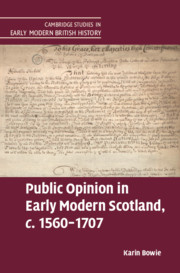Book contents
- Public Opinion in Early Modern Scotland, c.1560–1707
- Cambridge Studies in Early Modern British History
- Public Opinion in Early Modern Scotland, c.1560–1707
- Copyright page
- Contents
- Acknowledgements
- Abbreviations
- Introduction
- Chapter 1 Protestations
- Chapter 2 Petitions
- Chapter 3 Oaths
- Chapter 4 Public Communications
- Chapter 5 The Inclinations of the People
- Chapter 6 The Sense of the Nation
- Conclusions
- Bibliography
- Index
Chapter 6 - The Sense of the Nation
Published online by Cambridge University Press: 21 December 2020
- Public Opinion in Early Modern Scotland, c.1560–1707
- Cambridge Studies in Early Modern British History
- Public Opinion in Early Modern Scotland, c.1560–1707
- Copyright page
- Contents
- Acknowledgements
- Abbreviations
- Introduction
- Chapter 1 Protestations
- Chapter 2 Petitions
- Chapter 3 Oaths
- Chapter 4 Public Communications
- Chapter 5 The Inclinations of the People
- Chapter 6 The Sense of the Nation
- Conclusions
- Bibliography
- Index
Summary
Capturing the cumulative effect of the innovative modes of engagement outlined in previous chapters, this chapter examines a term for Scottish public opinion that had become current by the end of the seventeenth century: the sense of the nation. This phrase (and its variants, the sentiments or mind of the nation) suggested the thoughtful conclusions of a national political community. Attention was drawn to these extra-institutional opinions by changes arising from the 1688-90 Revolution, including greater freedom of debate in parliament, the confirmation of a right to petition the crown and weaker monarchical oversight of Scottish politics from London. As a series of scandals created discontent in Scotland, a ‘Country’ opposition re-energised adversarial petitioning alongside political pamphleteering. In 1706-7, opponents of proposals for an incorporating Anglo–Scottish union asserted collective objections in petitions, pamphlets, speeches and street protests, securing some treaty amendments alongside measures to safeguard parliament from violent resistance. Though the stature of extra-institutional opinion was still contested, these efforts to defuse its force indicate its contemporary profile in Scottish political culture.
Keywords
- Type
- Chapter
- Information
- Public Opinion in Early Modern Scotland, c.1560–1707 , pp. 211 - 238Publisher: Cambridge University PressPrint publication year: 2020

